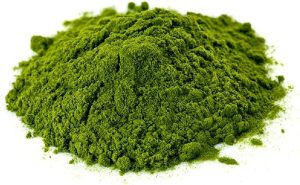
- Overview of Flax Seed Oil Powder
- Brief History of Flax Seed Oil Powder
- Functions of Flax Seed Oil Powder
- Recommended Daily Intake (RDI), Recommended Dietary Allowance (RDA), Adequate Intake (AI), or Reference Nutrient Intake (RNI) for Flax Seed Oil Powder
- Deficiency of Flax Seed Oil Powder
- Food Sources of Flax Seed Oil Powder and Where to Get It From
- Flax Seed Oil Powder and Its Interaction with Other Medications
- Websites and Articles to Delve into the Benefits of Flax Seed Oil Powder
- Disclaimer
Overview of Flax Seed Oil Powder
Flaxseed oil powder, derived from flaxseeds, is a nutrient-rich supplement known for its high content of alpha-linolenic acid (ALA), a beneficial omega-3 fatty acid. Rich in omega-6 and omega-9 fatty acids as well, it contributes to heart health, supports brain function, and may alleviate inflammation, benefiting joint and skin health. Flaxseed oil’s potential digestive benefits stem from its fiber content. Available in liquid, softgel, or convenient powder forms, it offers versatile incorporation into various diets.
Despite its susceptibility to oxidation, advanced processing techniques enhance stability. Individuals with flaxseed allergies should exercise caution. For personalized advice, consulting with healthcare professionals is recommended before integrating flaxseed oil powder into one’s routine.
Brief History of Flax Seed Oil Powder
The use of flaxseed, from which flaxseed oil is derived, dates back thousands of years. Historical records indicate that flax cultivation and the utilization of its seeds for various purposes, including medicinal and nutritional uses, can be traced to ancient civilizations.
- Ancient Cultures:
- Flax was cultivated by ancient civilizations, including the Egyptians and Mesopotamians, for its versatile properties. It was used not only for its seeds but also for its fibers to make linen.
- Medicinal Uses:
- Traditional medicinal systems, such as Ayurveda and traditional Chinese medicine, recognized the therapeutic properties of flaxseed. It was often used to address digestive issues and promote overall well-being.
- Dietary and Nutritional Value:
- Over time, flaxseed gained recognition for its nutritional value, particularly its high omega-3 fatty acid content. The extraction of flaxseed oil became a popular method to concentrate these beneficial fatty acids.
- Modern Processing:
- Advances in food processing led to the development of flaxseed oil powder, providing a convenient and stable form for supplementation. This form retains the nutritional benefits of flaxseed oil while offering versatility in culinary applications.
Today, flaxseed oil and its powdered form are widely used as dietary supplements, recognized for their potential cardiovascular, cognitive, and anti-inflammatory benefits. The historical use of flaxseed as a functional food and medicinal plant has contributed to its continued popularity in modern health and wellness practices.
Here’s a brief history of flaxseed oil powder presented in a table format:
| Time Period | Historical Developments |
|---|---|
| Ancient Civilizations | – Flax cultivation by civilizations like Egyptians and Mesopotamians. |
| – Use of flax for various purposes, including fiber for linen. | |
| Traditional Medicine | – Recognition in Ayurveda and traditional Chinese medicine for medicinal uses. |
| – Addressing digestive issues and promoting well-being. | |
| Nutritional Recognition | – Growing awareness of the nutritional value of flaxseed. |
| – Identification of high omega-3 fatty acid content in flaxseed oil. | |
| Modern Processing | – Extraction of flaxseed oil for concentrated nutritional benefits. |
| – Development of flaxseed oil powder for stability and versatility. | |
| Contemporary Usage | – Widely used as a dietary supplement for cardiovascular, cognitive, and anti-inflammatory benefits. |
| – Integration into modern health and wellness practices. |
This table provides a concise overview of the historical developments and evolution of flaxseed and flaxseed oil powder over time.
Functions of Flax Seed Oil Powder
Flaxseed oil powder offers various health benefits due to its rich nutritional profile, primarily featuring essential fatty acids. Here are the key functions and potential roles of flaxseed oil powder:
- Source of Essential Fatty Acids:
- Flaxseed oil is a plant-based source of alpha-linolenic acid (ALA), a type of omega-3 fatty acid crucial for heart and brain health.
- Cardiovascular Health:
- Omega-3 fatty acids may contribute to cardiovascular health by supporting normal cholesterol levels, reducing inflammation, and improving blood vessel function.
- Brain Function:
- Omega-3s, particularly ALA, play a role in maintaining cognitive function and supporting overall brain health.
- Joint Health:
- The omega-3 fatty acids in flaxseed oil may help reduce inflammation, potentially benefiting joint health and relieving symptoms of conditions like arthritis.
- Skin and Hair Health:
- Essential fatty acids contribute to skin hydration, potentially benefiting skin health. They may also promote healthy hair.
- Digestive Health:
- While the oil itself is devoid of fiber, whole flaxseeds contain fiber, which may contribute to digestive regularity.
- Nutrient Absorption:
- As a source of healthy fats, flaxseed oil may aid in the absorption of fat-soluble vitamins, such as vitamin A, D, E, and K.
- Anti-Inflammatory Properties:
- Flaxseed oil helps balance the ratio of omega-6 to omega-3 fatty acids, potentially reducing chronic inflammation.
- Weight Management:
- The healthy fats in flaxseed oil may contribute to a feeling of fullness, potentially supporting weight management.
- Stable Powder Form:
- Flaxseed oil powder offers the nutritional benefits of the oil in a stable and convenient powder form, allowing for versatile incorporation into various foods and beverages.
Considerations:
- Oxidative Stability:
- Flaxseed oil is susceptible to oxidation, and advanced processing techniques may be used to enhance stability in powder form.
- Allergies:
- Individuals with allergies to flaxseeds should exercise caution.
- Medication Interactions:
- Consult with healthcare professionals, especially if on medications, due to potential interactions.
As with any supplement, it’s advisable to consult with healthcare professionals before incorporating flaxseed oil powder into your routine, especially if you have underlying health conditions or are taking medications.
Recommended Daily Intake (RDI), Recommended Dietary Allowance (RDA), Adequate Intake (AI), or Reference Nutrient Intake (RNI) for Flax Seed Oil Powder
There are no established Recommended Daily Intake (RDI), Recommended Dietary Allowance (RDA), Adequate Intake (AI), or Reference Nutrient Intake (RNI) specifically for flaxseed oil powder. These recommendations are typically established for essential nutrients like vitamins and minerals rather than specific food extracts or supplements.
Flaxseed oil powder is often used as a dietary supplement, and the dosage can vary based on individual health goals, age, sex, and overall health status. The appropriate dosage may also depend on the concentration of omega-3 fatty acids, particularly alpha-linolenic acid (ALA), in the specific flaxseed oil powder product.
If you are considering adding flaxseed oil powder to your diet or supplement routine, it’s advisable to follow the recommended dosage provided on the product label. Additionally, consulting with a healthcare professional or a registered dietitian is recommended, especially if you have underlying health conditions or are taking medications. They can provide personalized advice based on your individual health status.
Please note that information and guidelines may have evolved since my last update, so it’s a good idea to check with authoritative sources or healthcare professionals for the most current information on dietary supplements.
Deficiency of Flax Seed Oil Powder
Flaxseed oil powder itself is not an essential nutrient, and thus, the concept of a deficiency does not directly apply. However, if individuals are not obtaining sufficient essential fatty acids, particularly omega-3 fatty acids like alpha-linolenic acid (ALA), which are found in flaxseed oil, they may experience a deficiency in these essential nutrients. Here are potential signs or consequences of insufficient omega-3 fatty acids:
- Impaired Cognitive Function:
- Omega-3 fatty acids, including ALA, are crucial for brain health. Inadequate intake may impact cognitive function, memory, and overall brain performance.
- Cardiovascular Issues:
- Omega-3s play a role in cardiovascular health by supporting normal cholesterol levels, reducing inflammation, and improving blood vessel function. A deficiency may contribute to cardiovascular issues.
- Dry Skin and Hair:
- Essential fatty acids contribute to skin and hair health. Inadequate intake may result in dry skin, hair, or other dermatological issues.
- Joint Discomfort:
- Omega-3s have anti-inflammatory properties that may benefit joint health. A deficiency might contribute to joint discomfort or exacerbate conditions like arthritis.
- Vision Issues:
- Omega-3 fatty acids are found in high concentrations in the retina. Inadequate intake may impact visual function and contribute to vision issues.
- Mood and Emotional Well-being:
- Omega-3s are associated with mood regulation, and a deficiency may contribute to mood disorders or emotional imbalances.
It’s essential to note that while omega-3 fatty acids are crucial for health, they can be obtained from various sources, and flaxseed oil is just one of them. Fatty fish, chia seeds, walnuts, and other foods also contain omega-3s.
If you suspect a deficiency in essential fatty acids, including omega-3s, it’s advisable to consult with a healthcare professional or a registered dietitian. They can assess your dietary intake, health status, and provide guidance on appropriate dietary changes or supplementation if needed.
Food Sources of Flax Seed Oil Powder and Where to Get It From
Flaxseed oil powder is derived from flaxseeds, and it is often used as a dietary supplement. Here are food sources of flaxseed oil and where you can obtain it:
- Whole Flaxseeds:
- Whole flaxseeds are widely available in grocery stores, health food stores, and online. Look for them in the bulk foods section or with other seeds.
- Flaxseed Oil:
- Flaxseed oil is commonly found in health food stores, grocery stores, and online. It’s typically available in dark glass bottles to protect it from light and oxidation.
- Flaxseed Oil Capsules:
- Flaxseed oil is available in capsule form, which is convenient for those who prefer a measured dose. Health food stores, pharmacies, and online retailers carry flaxseed oil capsules.
- Flaxseed Oil Powder:
- Flaxseed oil powder is often found in health food stores and online retailers. It may be available in loose powder form or in convenient pre-measured packets.
- Flaxseed Oil-Enriched Foods:
- Some food products, such as certain types of bread, cereals, and nutrition bars, may be enriched with flaxseed oil or ground flaxseeds. Check the labels of these products at grocery stores or health food stores.
- Flaxseed Oil Supplements:
- Flaxseed oil supplements, in various forms such as softgel capsules, can be found in health food stores, pharmacies, and online. Check with local retailers or online platforms that specialize in dietary supplements.
Tips for Purchase:
- Quality:
- Choose high-quality, cold-pressed flaxseed oil or capsules to ensure the preservation of nutritional integrity.
- Storage:
- Store flaxseed oil products in a cool, dark place to prevent oxidation.
- Supplement Brands:
- When purchasing flaxseed oil supplements or powder, choose reputable brands known for quality and transparency.
Always read product labels to understand the concentration of omega-3 fatty acids, particularly alpha-linolenic acid (ALA), in the product. If you have specific health concerns or are considering the use of flaxseed oil for therapeutic reasons, it’s recommended to consult with a healthcare professional or a registered dietitian for personalized advice.
Flax Seed Oil Powder and Its Interaction with Other Medications
Flaxseed oil, including its powdered form, may interact with certain medications, and it’s essential to be aware of potential issues. Here are considerations regarding the interaction of flaxseed oil powder with medications:
- Blood-Thinning Medications:
- Interaction: Flaxseed oil has mild anticoagulant properties and may increase the risk of bleeding, especially when used in conjunction with blood-thinning medications like warfarin, aspirin, or clopidogrel.
- Caution: Individuals taking blood-thinning medications should consult their healthcare provider before using flaxseed oil powder to avoid potential complications.
- Blood Sugar-Lowering Medications:
- Interaction: Flaxseed oil may have hypoglycemic effects and could enhance the action of medications used to lower blood sugar, such as insulin or oral hypoglycemic drugs.
- Caution: Individuals with diabetes taking medications to control blood sugar levels should monitor their levels closely and consult their healthcare provider before using flaxseed oil powder.
- Blood Pressure Medications:
- Interaction: Flaxseed oil may have a mild hypotensive effect, potentially lowering blood pressure. Combining it with antihypertensive medications may lead to an additive effect.
- Caution: Individuals on blood pressure medications should monitor their blood pressure regularly, and dosage adjustments may be necessary under the guidance of a healthcare professional.
- Hormonal Medications:
- Interaction: Flaxseed oil contains compounds called lignans, which may have weak estrogenic effects. This could theoretically interact with hormonal medications, such as estrogen or hormonal contraceptives.
- Caution: Individuals on hormonal medications should consult their healthcare provider before using flaxseed oil powder.
- Gastrointestinal Medications:
- Interaction: Flaxseed oil may have mild laxative effects, and its use might interact with medications that affect the gastrointestinal tract.
- Caution: Individuals on medications for gastrointestinal conditions should discuss the use of flaxseed oil powder with their healthcare provider.
General Tips:
- Consultation: Always consult with a healthcare professional before adding flaxseed oil powder or any new dietary supplement to your routine, especially if you are taking medications.
- Monitoring: Regular monitoring of blood pressure, blood sugar levels, and other relevant parameters may be advisable.
Individual responses to interactions can vary, so it’s crucial to communicate openly with healthcare providers about all supplements and medications being used. Healthcare professionals can provide personalized advice based on an individual’s health status and specific needs.
Websites and Articles to Delve into the Benefits of Flax Seed Oil Powder
When exploring the benefits of flaxseed oil powder, it’s important to refer to reputable sources that provide evidence-based information. Here are some websites and articles that delve into the potential benefits of flaxseed oil:
- National Center for Biotechnology Information (NCBI):
- Website: NCBI
- Search Term: Use the search function to find research articles on flaxseed oil and its health benefits.
- PubMed:
- Website: PubMed
- Search Term: Look for articles related to “flaxseed oil benefits” or specific health conditions you are interested in.
- Examine.com:
- Website: Examine.com – Flaxseed Oil
- Content: Examine.com provides evidence-based information on various supplements, including flaxseed oil.
- Mayo Clinic:
- Website: Mayo Clinic – Flaxseed and flaxseed oil
- Content: Mayo Clinic offers a comprehensive overview of flaxseed and flaxseed oil, including potential health benefits.
- WebMD:
- Website: WebMD – Flaxseed Oil: Benefits, Side Effects, Dosage, and Interactions
- Content: WebMD provides information on the benefits, side effects, dosage, and interactions of flaxseed oil.
Disclaimer
The information is solely provided for educational purposes. It is not intended to diagnose, treat, cure, or prevent any disease. Seek the advice of your physician or qualified healthcare provider with any questions you may have regarding a medical condition at all times. Never disregard professional medical advice because of something you have read or learned from this article.






